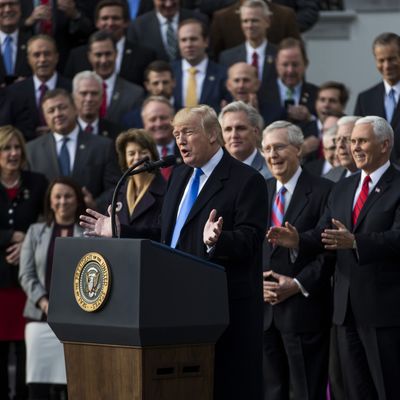
When Robert Mueller was hired to investigate Russian interference in the 2016 election and possible connections to the Trump campaign, Republicans in Congress supported Mueller, and even warned Trump not to interfere with his work. “Any effort to go after Mueller could be the beginning of the end of the Trump presidency,” warned Senator Lindsey Graham. “I believe if he did fire Bob Mueller, you would see a special prosecutor statute go through both houses by veto-proof majorities and we’d end up with Bob Mueller in charge of a new investigation with new authorities,” predicted Senator Angus King.
Many Trump critics assume at least implicitly that these conditions still pertain. But the reality as of January 2018 is not the reality of last summer. The Republican Party has largely coalesced around Trump. If — or when — Trump quashes Mueller’s investigation, the veto-proof majorities to restore Mueller’s power will almost certainly fail to materialize.
I read conservative commentary every day. Before Trump won the Republican nomination, sentiment among conservative pundits (if not voters) ran overwhelmingly against him. Over the last year, that opinions have moved toward Trump in several jagged lurches. The first occurred when Trump sealed up the Republican nomination, at which point anti-Trump sentiment could not longer be channeled into a prospective Rubio or Cruz nomination. Another column of opponents peeled off after Trump surprisingly defeated Hillary Clinton, at which point four or more years of opposition looked like more than many “Never Trumpers” had signed up for.
Over the last couple months, opinion has moved in Trump’s direction again. It is hard to identify the precise source of this movement. The passage of the tax cut is the most identifiable cause, having given Trump’s party proof he does not plan an ideological betrayal, and an identifiable investment in his success.
Oddly enough, the publication of Michael Wolff’s book Fire and Fury is another. The book led to the full-scale excommunication of Steve Bannon, who had been threatening primary challenges against leading Republican Senators. The disappearance of Bannon removed a major source of friction between the president and his party, while demonstrating that the base belongs entirely to Trump, not the self-styled avatar of his ideology. “Trump’s disavowal of Bannon, his former campaign chief executive and White House strategist, and Bannon’s ensuing contrition reminds fractious Republicans that this is Trump’s party now,” gloats Christopher Buskirk, editor of the Trumpist journal American Greatness.
Evidence of the shift can be seen in the outer edges of the Republican coalition, where opposition to Trump has melted away like the shelf of a glacier in summertime. The moderate columnist David Brooks recently pronounced Trump more competent and informed than widely believed, and decried the excesses of his critics. “Some of the president’s fiercest critics on the right are starting to recognize how their side’s animosity is burning out of control,” gloats Fox News media critic Howard Kurtz.
The party elite’s broader warming toward the president has also translated into a specific rapprochement on the Russia scandal. Susan Collins, the most moderate Republican in either chamber, casually stated that Russia, rather than intervening on Trump’s behalf in the 2016 election, was “for and against” both candidates. (Contrary to Collins, U.S. intelligence has concluded that Russia’s goals included helping Trump win.) Senate Democrats had to release a report on Russia’s global campaign of political interference, and recommending protective measures, on their own. This was the kind of report that might have commanded bipartisan support even a few months ago. That no Republicans signed onto it is a telling sign.
Trump’s defensive comments have begun to incorporate the claim that even Democrats admit there is no collusion between him and Russia. “There is absolutely no collusion, that’s been proven by every Democrat is saying it,” he told the New York Times last month, “Virtually every Democrat has said there is no collusion. … I saw Dianne Feinstein the other day on television saying there is no collusion.”
Feinstein has said nothing of the sort. Leading Democrats have said they have seen a great deal of evidence of collusion between Trump and Russia. This is the undeniable conclusion of anybody who follows the Russia investigation in the news. The scandal continues to widen, as more and more channels of secret cooperation between Trump and Russia emerge.
But Trump and his party aren’t responding to the news. They’re responding to party-controlled pseudo-news outlets. In those media, a completely different narrative has developed. The collusion charge has collapsed, and desperate Democrats recognize that Mueller’s investigation — which has supposedly gone on a long time — is flailing about. Conservative pundits dismiss Mueller’s probe as going nowhere and turning up no evidence of misdeeds so routinely that they don’t even bother to substantiate an observation they consider perfectly obvious.
Meanwhile, extremely damning evidence has emerged of sinister conspiracies against Trump. The House has abandoned all but the pretense of investigating Russian election interference, and is instead running a counter-investigation into alleged liberal bias in the FBI. Last year, Senate Republicans endorsed measures to protect Mueller from Trump. Their support has melted away, and the bills have all gone nowhere.
Democrats believe that the Mueller investigation enjoys the relative safety of a bipartisan consensus that formed behind it last year. Trump cannot fire Mueller or purge the Justice Department, many of them think, because it would be an obvious outrage and a tacit confession of guilt. That understanding may describe the world of 2017. But that world is gone.






























